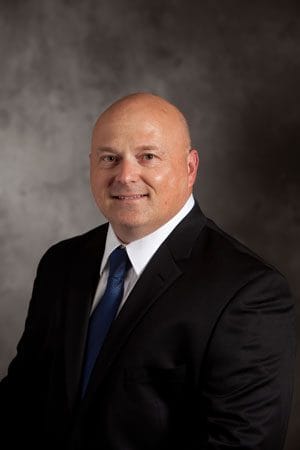
Manufacturing Systems Engineering graduate future-proofs his career
Although Richard Ohrt already earned his bachelor’s in mechanical engineering as well as an MBA and was comfortably employed, he knew there were skills he needed in his educational toolbox.
The strategic manufacturing engineer at John Deere in Waterloo, Iowa, set his sights on a graduate program focused specifically on manufacturing engineering: The University of Wisconsin–Madison Manufacturing Systems Engineering (MSE) master’s.
“As I observed the manufacturing landscape, I witnessed a lot of reactions rather than proactive data-based decisions. Talking with a few colleagues, it became clear that I needed to keep my skills relevant with the future of manufacturing,” says Ohrt. “Big data analytics and a more process-based approach was clearly needed for manufacturing to remain globally competitive, which was the primary driver for pursuing the MSE degree.”
A program built for modern engineers
Ohrt’s position required extensive travel, so he needed a program that was flexible and could work around his hectic schedule. The MSE program was a perfect fit.

The curriculum is taught by industry experts and is project-based, so tools and concepts learned in class can be immediately applied to real-life engineering challenges. Designed for working professionals, the program is completely online, which allowed Ohrt the flexibility to complete his studies wherever he was that given day.
“I rarely recall not being able to actively participate in the discussions, even if it meant late night or early morning calls from the road,” says Ohrt. “The class sizes were just about right to ensure great collaboration with the other students, while the instructors were still available nearly whenever they were needed.”
Ohrt admits that the curriculum was more challenging than work he’d done in his MBA program and took some adjusting to, especially after being out of school for a period of time. In order to balance the rigorous curriculum, his career and family, he decided to keep his summers open, opting to complete the program at his pace. The summer break also gave him time to recharge for fall.
“It took some time to get into the academic rhythm and not fall behind in the initial weeks, but once you get into the rhythm, you will succeed,” says Ohrt. “You can rush through and graduate earlier, but that was not my personal motivation. The end state need not be the diploma on the wall, rather what you learn in the program.”
Launchpad for the next step
Ohrt cites the program as an investment in his business future.
“We are competing on a global scale, so it’s imperative to continually improve, and I think most employers understand this. The employees who continually seek out such improvement will make them a valuable asset to the business,” says Ohrt. “The bridge between engineering and traditional IT roles is blurring. For those who can learn to bridge this traditional divide, the future is quite bright.”
Learn more about UW–Madison’s Master of Engineering in Engineering: Manufacturing Systems Engineering.
Published on Oct 09 2020
Last Updated on Jul 11 2024
By Autumn Sanchez
Categories: Professional Degrees & Certificates
Tags: pdc-blog


